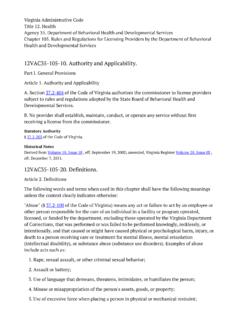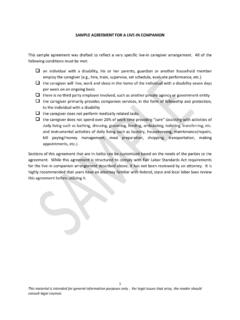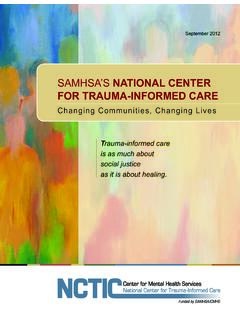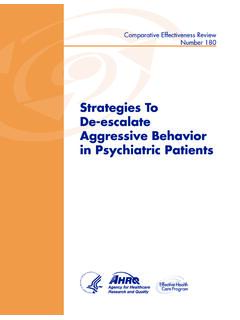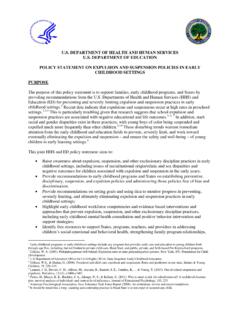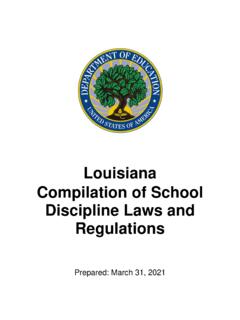Transcription of CHAPTER 105 RULES AND REGULATIONS FOR LICENSING …
1 Page 1 of 55 CHAPTER 105 RULES AND REGULATIONS FOR LICENSING PROVIDERS BY THE DEPARTMENT OF behavioral health AND DEVELOPMENTAL services Part I General Provisions Article 1 Authority and Applicability 12 VAC35-105-10. Authority and applicability. A. Section of the Code of Virginia authorizes the commissioner to license providers subject to RULES and REGULATIONS adopted by the State Board of behavioral health and Developmental services . B. No provider shall establish, maintain, conduct, or operate any service without first receiving a license from the commissioner. Article 2 Definitions 12 VAC35-105-20. Definitions. The following words and terms when used in this CHAPTER shall have the following meanings unless the context clearly indicates otherwise: "Abuse" ( of the Code of Virginia) means any act or failure to act by an employee or other person responsible for the care of an individual in a facility or program operated, licensed, or funded by the department, excluding those operated by the Virginia Department of Corrections, that was performed or was failed to be performed knowingly, recklessly, or intentionally, and that caused or might have caused physical or psychological harm, injury, or death to a person receiving care or treatment for mental illness, mental retardation (intellectual disability), or substance abuse (substance use disorders).
2 Examples of abuse include acts such as: 1. Rape, sexual assault, or other criminal sexual behavior; 2. Assault or battery; 3. Use of language that demeans, threatens, intimidates, or humiliates the person; 4. Misuse or misappropriation of the person's assets, goods, or property; 5. Use of excessive force when placing a person in physical or mechanical restraint; 6. Use of physical or mechanical restraints on a person that is not in compliance with federal and state laws, REGULATIONS , and policies, professional accepted standards of practice, or the person's individualized services plan; 7. Use of more restrictive or intensive services or denial of services to punish the person or that is not consistent with his individualized services plan. "Activities of daily living" or "ADLs" means personal care activities and includes bathing, dressing, transferring, toileting, grooming, hygiene, feeding, and eating.
3 An individual's degree of independence in performing these activities is part of determining the appropriate level of care and services . "Admission" means the process of acceptance into a service as defined by the provider's policies. "Authorized representative" means a person permitted by law or 12 VAC35-115 to authorize the disclosure of information or consent to treatment and services or participation in human research. "Behavior intervention" means those principles and methods employed by a provider to help an individual receiving services to achieve a positive outcome and to address challenging behavior in a constructive and safe manner. Behavior intervention principles and methods must be employed in accordance with the individualized services plan and written policies and procedures governing service expectations, treatment goals, safety, and security.
4 Page 2 of 55 " behavioral treatment plan," "functional plan," or " behavioral support plan" means any set of documented procedures that are an integral part of the individualized services plan and are developed on the basis of a systematic data collection, such as a functional assessment, for the purpose of assisting individuals to achieve the following: 1. Improved behavioral functioning and effectiveness; 2. Alleviation of symptoms of psychopathology; or 3. Reduction of challenging behaviors. "Brain injury" means any injury to the brain that occurs after birth, but before age 65, that is acquired through traumatic or nontraumatic insults. Nontraumatic insults may include anoxia, hypoxia, aneurysm, toxic exposure, encephalopathy, surgical interventions, tumor, and stroke. Brain injury does not include hereditary, congenital, or degenerative brain disorders or injuries induced by birth trauma.
5 "Care" or "treatment" means the individually planned therapeutic interventions that conform to current acceptable professional practice and that are intended to improve or maintain functioning of an individual receiving services delivered by a provider. "Case management service" means services that can include assistance to individuals and their family members in assessing needed services that are responsive to the person's individual needs. Case management services include: identifying potential users of the service; assessing needs and planning services ; linking the individual to services and supports; assisting the individual directly to locate, develop, or obtain needed services and resources; coordinating services with other providers; enhancing community integration; making collateral contacts; monitoring service delivery; discharge planning; and advocating for individuals in response to their changing needs.
6 "Case management service" does not include maintaining service waiting lists or periodically contacting or tracking individuals to determine potential service needs. "Clinical experience" means providing direct services to individuals with mental illness or the provision of direct geriatric services or special education services . Experience may include supervised internships, practicums, and field experience. "Commissioner" means the Commissioner of the Department of behavioral health and Developmental services . "Community gero-psychiatric residential services " means 24-hour care provided to individuals with mental illness, behavioral problems, and concomitant health problems who are usually age 65 or older in a geriatric setting that is less intensive than a psychiatric hospital but more intensive than a nursing home or group home.
7 services include assessment and individualized services planning by an interdisciplinary services team, intense supervision, psychiatric care, behavioral treatment planning and behavior interventions, nursing, and other health related services . "Community intermediate care facility/mental retardation (ICF/MR)" means a residential facility in which care is provided to individuals who have mental retardation (intellectual disability) or a developmental disability who need more intensive training and supervision than may be available in an assisted living facility or group home. Such facilities shall comply with Title XIX of the Social Security Act standards and federal certification requirements, provide health or rehabilitative services , and provide active treatment to individuals receiving services toward the achievement of a more independent level of functioning or an improved quality of life.
8 "Complaint" means an allegation of a violation of these REGULATIONS or a provider's policies and procedures related to these REGULATIONS . "Co-occurring disorders" means the presence of more than one and often several of the following disorders that are identified independently of one another and are not simply a cluster of symptoms resulting from a single disorder: mental illness, mental retardation (intellectual disability), or substance abuse (substance use disorders); brain injury; or developmental disability. "Co-occurring services " means individually planned therapeutic treatment that addresses in an integrated concurrent manner the service needs of individuals who have co-occurring disorders. "Corrective action plan" means the provider's pledged corrective action in response to cited areas of noncompliance documented by the regulatory authority.
9 A corrective action plan must be completed within a specified time. "Correctional facility" means a facility operated under the management and control of the Virginia Department of Corrections. "Crisis" means a deteriorating or unstable situation often developing suddenly or rapidly that produces acute, heightened, emotional, mental, physical, medical, or behavioral distress; or any situation or circumstance in which the individual perceives or experiences a sudden loss of his ability to use effective problem-solving and coping skills. Page 3 of 55 "Crisis stabilization" means direct, intensive nonresidential or residential direct care and treatment to nonhospitalized individuals experiencing an acute crisis that may jeopardize their current community living situation. Crisis stabilization is intended to avert hospitalization or rehospitalization; provide normative environments with a high assurance of safety and security for crisis intervention; stabilize individuals in crisis; and mobilize the resources of the community support system, family members, and others for ongoing rehabilitation and recovery.
10 "Day support service" means structured programs of activity or training services for adults with an intellectual disability or a developmental disability, generally in clusters of two or more continuous hours per day provided to groups or individuals in nonresidential community-based settings. Day support services may provide opportunities for peer interaction and community integration and are designed to enhance the following: self-care and hygiene, eating, toileting, task learning, community resource utilization, environmental and behavioral skills, social skills, medication management, prevocational skills, and transportation skills. The term "day support service" does not include services in which the primary function is to provide employment-related services , general educational services , or general recreational services .
